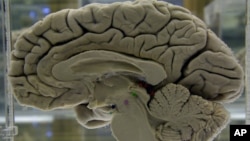Welcome to VOA Learning English. This is As It Is! I’m Anna Matteo.
On today’s show we will talk about … wait a minute. What was I going to talk about? I was just about to say… oh, yes – memory!
When we are young, we expect to remember things easily. But as we age, it gets harder and harder to remember things.
Later in the show, we will talk about how some popular drinks may help keep your memory sharp and active.
But first, we talk about another way to improve memory. Researchers have found that an aging brain does not have to lose its ability to remember. All it takes is some training and exercises. We have a useful expression for that: Use it or lose it!
Here is Christopher Cruise with more.
Cognitive Training and Memory
Some kinds of mental skills naturally decrease as people get older. Yet research seems to show that some training can improve such skills.
A recently published study also appears to demonstrate that the good effects of training can last for many years after that training has ended. Researchers at Johns Hopkins University in Maryland wanted to learn how long memory and thinking skills would last in older people who trained to keep them. The people were part of a 10-year research project. They were taught methods meant to improve their memory, thinking and ability to perform everyday tasks.
More than 2,800 volunteered for the study called ACTIVE, short for Advanced Training for Independent and Vital Elderly. Most started when they were more than 70 years old.
One class trained participants in skills including how to remember word lists. Another group trained in reasoning. A third group received help with speed of processing – speed of receiving and understanding information. A fourth group, the control group, did not get any training.
Earlier results had established that the training helped the participants for up to five years. Now, lead study writer George Rebok says the research showed most of the training remained effective a full 10 years later.
“We were wondering whether those effects would endure over time and would still be there 10 years following the training, and in fact that’s exactly what we found.”
The effect on memory, however, seemed not to last as long. Still, the older people in any of the three classes generally reported less difficulty in performing daily activities than the control group.
Professor Rebok and his team are now considering ways to provide such training for lower cost.
“We are trying to make the training more broadly available. For example, we have a grant right now from the National Institute on Aging to try to make a Web-based version of the active memory training and then put the training online.”
One question still to be studied is how only a few hours of training can still be effective after 10 years. The study appears in the Journal of the American Geriatrics Society.
I’m Christopher Cruise.
And I’m Anna Matteo. You are listening to As It Is from the VOA Learning English.
We just heard how mental exercises and training can keep your memory working at full speed. But did you know that some common, everyday drinks can also improve your long-term memory?
Study Finds Caffeine Improves Long-Term Memory
Many people say they cannot start their day without first having a cup of coffee or tea. People say these drinks help them think clearly and feel more awake. This is because of caffeine, a substance found in some plants. Caffeine helps to give a jump start to the nervous system.
Now, a report says it may also improve long-term memory. The report was published earlier this year in the journal Nature Neuroscience.
Mike Yassa is a neurobiology professor at the University of California, Irvine. He and other researchers wanted to know if caffeine could improve a person’s memory.
They asked a group of individuals to learn something new. Then, the same people were given caffeine, the active ingredient in coffee, tea and chocolate. Professor Yassa explains.
“So after you learn anything, it takes some time for that memory to strengthen and become resistant to forgetting. And over the first 24 hours is actually where most of the forgetting happens. So that is where we wanted to intervene with caffeine and see if we can help reduce this forgetting to some extent.”
According to Dr. Yassa the first 24 hours are when we are most at risk of forgetting something new we’ve learned. That is the time to drink a strong cup of coffee or tea, or eat some chocolate.
This is what he and his team did. They took 160 caffeine-free people and showed them pictures of everyday objects. These people were asked if the objects could be found inside the house or outdoors.
Then some of the subjects were given a caffeine pill. The others were given a placebo -- a pill containing nothing.
Twenty-four hours later, the subjects were shown the exact same images from the day before. They were also shown images with slight differences, and some completely new images.
Both groups correctly identified the exact same and completely new pictures. But those who took the caffeine pill were better at spotting the pictures that were slightly different.
Professor Yassa says their answers helped to show the effects of caffeine on memory.
“When they actually had to make a memory judgment and say, 'Is this the same item I have seen before or not?' that was a really important bit of information for us. And we find that if they are on caffeine they are much more likely to make the right decision.”
The amount of caffeine the researchers used in the study was similar to one cup of strong coffee.
The researchers did not see any improvement to memory from smaller doses of caffeine or when it was given an hour before viewing the images.
Do you have any tricks for remember things? Share it in our comment section!
I’m Anna Matteo. Join us again tomorrow for another As It Is!
We are sorry, but this feature is currently not available







